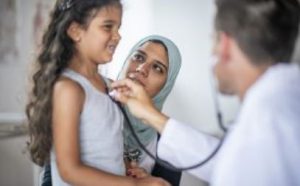Migrants denied healthcare across the globe – report
Millions of migrants across the world do not have access to government funded healthcare that is available to citizens, a new report has found.
The report by the International Organisation for Migration (IOM) found only half of the countries worldwide grant access to government-funded health services to all migrants.
It says that migrant inclusion and access to basic services is uneven and remains a global challenge.
The report, by IOM’s Migration Governance Indicators (MGI) initiative, calls on nations to intensify efforts to improve access to health and other services through a people-centred approach that engages the whole-of-government.
“More people can access essential health services today than ever before, but many migrants still go without. Access to health services is a fundamental human right to all people regardless of their status, colour, sex, language, religion, and national or social origins,” the report says.
 Following the report’s release, OM Deputy Director General for Operations, Ugochi Daniels said: “This year is an opportunity to stand up and make progress through impactful health policies and services for all. The Migration Governance Indicators initiative shines a spotlight on the way forward”.
Following the report’s release, OM Deputy Director General for Operations, Ugochi Daniels said: “This year is an opportunity to stand up and make progress through impactful health policies and services for all. The Migration Governance Indicators initiative shines a spotlight on the way forward”.
The report includes key findings and recommendations in shaping migration policies – including migrant access to services – based on data from 100 national and 69 local-level assessments conducted between 2016 and 2023.
Access to services, such as health and education, is a key indicator of policies that promote migrants’ rights and equal opportunity. Yet, the range of legal access to these services in countries around the world varies widely, the report says.
For example, 18 per cent of the assessed countries in Europe legally enshrine the right to access health services, compared to 70 per cent of the countries assessed in the Americas.
The report found differences in health care coverage within national and sub-national levels, and between migrant categories such as refugees, labour migrants, asylum seekers, and international students.
“Evidence shows that health access is also hindered by migrants’ reluctance to seek medical care due to their migration status, financial constraints or fear of deportation. The report recommends that governments provide timely information to migrants about their rights and offer administrative alternatives to facilitate access for migrants with irregular status,” the report said.
As well as insights on migrants’ access to health services, the report analyses other key aspects of migration governance, including measures to trace missing migrants, disaster risk reduction strategies, labour immigration programs, data collection, national migration strategies, and engagement with diaspora communities.
Read the full report: Migration Governance Insights: Informing People-centred Migration Policies | IOM Publications Platform












